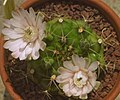Gymnocalycium anisitsii
| Gymnocalycium anisitsii | |
|---|---|

| |
| Scientific classification | |
| Kingdom: | Plantae |
| Clade: | Tracheophytes |
| Clade: | Angiosperms |
| Clade: | Eudicots |
| Order: | Caryophyllales |
| Family: | Cactaceae |
| Subfamily: | Cactoideae |
| Genus: | Gymnocalycium |
| Species: | G. anisitsii
|
| Binomial name | |
| Gymnocalycium anisitsii (K.Schumann) Britton & Rose, 1922
| |
| Synonyms | |
| |
Gymnocalycium anisitsii is a globular cactus belonging to the family Cactaceae. The specific epithet honors the Hungarian pharmacist Dániel Anisits J. (1856-1911).
Description
[edit]Gymnocalycium anisitsii can be solitary or slowly clustering with light green, often reddish or purple-tinged, spherical to short columnar shoots. It reaches a diameter of 8–15 cm and a height of about 10 cm. Sometimes a central spine is present, but it is usually absent. The eight to eleven ribs have pointed humps. Sometimes a central spine is present, but usually it is absent.The 5-7 spines are yellowish to brownish, slender, twisted and 1–6 cm long. The flowers are white to pink, funnel-shaped, up to 4 inches long. The red fruits are long and cylindrical, up to 2.5 cm long with a diameter of 1 cm.[2]
-
Flower
-
An example of Gymnocalycium anisitsii in bloom.
Subspecies
[edit]Accepted subspecies:
| Image | Scientific name | Distribution |
|---|---|---|
 |
Gymnocalycium anisitsii subsp. damsii (K.Schum.) G.J.Charles | Brazil (Mato Grosso do Sul) |
Distribution
[edit]Gymnocalycium anisitsii is widespread in southern Brazil, Paraguay and Bolivia. This species prefers open areas with the protection of low bushes.
Taxonomy
[edit]The first description as Echinocactus anisitsii was made in 1900 by Karl Moritz Schumann. The specific epithet anisitsii honors the Hungarian pharmacist Dániel J. Anisits (1856–1911), who supplied Karl Moritz Schumann with cacti. Nathaniel Lord Britton and Joseph Nelson Rose placed the species in the genus Gymnocalycium in 1922.[3]
-
Gymnocalycium anisitsii subsp. anisitsii. Illustration from Blühende Kakteen - Iconographia Cactacearum (1904)
References
[edit]- ^ "The IUCN Red List of Threatened Species". IUCN Red List of Threatened Species. 2010-09-22. Retrieved 2023-09-22.
- ^ Anderson, Edward F.; Eggli, Urs (2005). Das grosse Kakteen-Lexikon (in German). Stuttgart (Hohenheim): Ulmer. p. 311. ISBN 3-8001-4573-1.
- ^ Britton, Nathaniel Lord; Eaton, Mary E.; Rose, J. N.; Wood, Helen Adelaide (1919). The Cactaceae : descriptions and illustrations of plants of the cactus family. Washington: Carnegie Institution of Washington. doi:10.5962/bhl.title.46288.
External links
[edit] Media related to Gymnocalycium anisitsii at Wikimedia Commons
Media related to Gymnocalycium anisitsii at Wikimedia Commons Data related to Gymnocalycium anisitsii at Wikispecies
Data related to Gymnocalycium anisitsii at Wikispecies- Biolib
- Cactus-art
- Desert-tropicals
- Urs Eggli, Leonard E. Newton: Etymological Dictionary of Succulent Plant Names. Birkhäuser 2004
- N. L. Britton, J. N. Rose: The Cactaceae. Descriptions and Illustrations of Plants of the Cactus Family. Band III, The Carnegie Institution of Washington, Washington 1922




